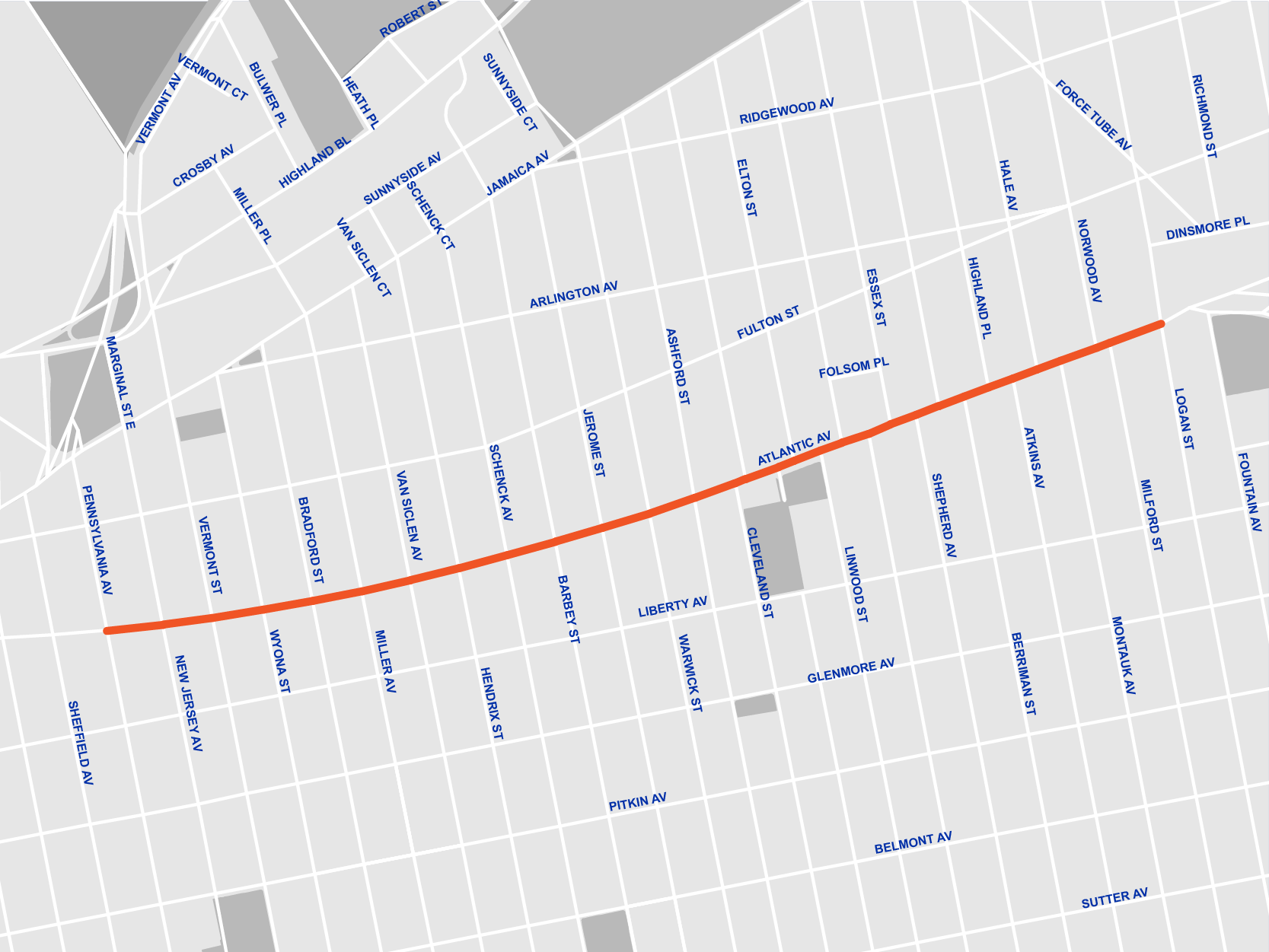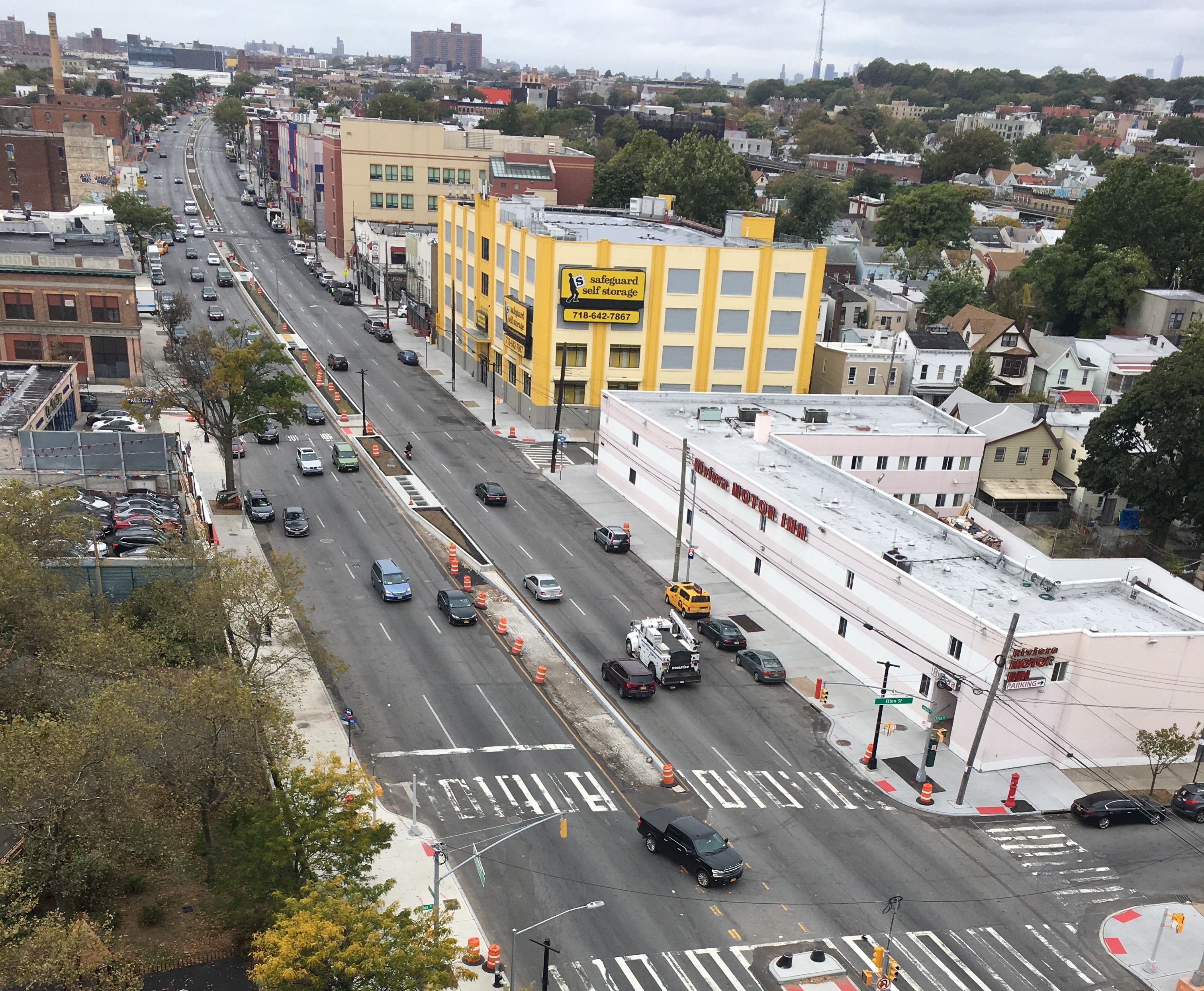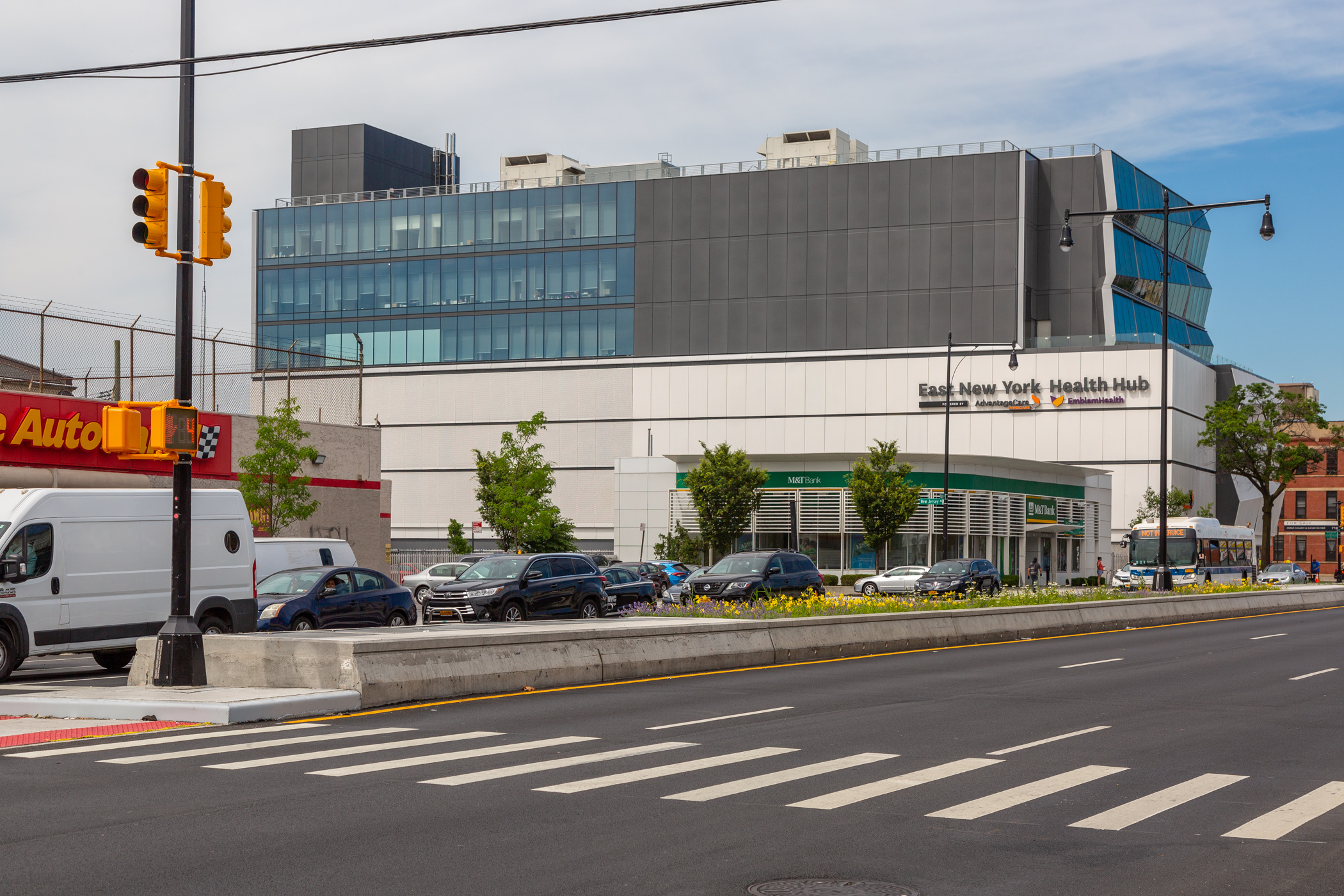
 Department of Design and Construction311
Department of Design and Construction311 Search all NYC.gov websites
Search all NYC.gov websites
NYC DOT, DDC, and DEP Announce Completion of First Phase of Atlantic Avenue, a Major "Great Street" Rebuilt in East New York, Brooklyn
(Brooklyn, NY – June 25, 2020) The NYC Department of Transportation (DOT), NYC Department of Design and Construction (DDC), NYC Department of Environmental Protection (DEP) today joined elected officials and community leaders to cut the ribbon on the completion of a $48 million project to rebuild a 21-block section of Atlantic Avenue in the East New York and Cypress Hills neighborhoods of Brooklyn. Atlantic Avenue is both among New York City’s Great Streets as well as a Vision Zero priority corridor, prioritized by the de Blasio Administration for major infrastructure improvements and safety enhancements.
The project is the first Great Streets project to be completed in the City. Construction began in September 2017 and was projected to be completed in winter 2020/21, but was completed six months ahead of schedule.

“The Great Streets program was designed to transform once-dangerous thoroughfares into more welcoming boulevards with calmer traffic that no longer divide surrounding neighborhoods,” said DOT Commissioner Polly Trottenberg. “Around New York City, we have started to show how effective that model has been on Queens Boulevard, the Grand Concourse and along 4th Avenue here in Brooklyn. Thanks to our partners at DDC who oversaw the early completion of this mile of Atlantic Avenue, residents of East New York and Cypress Hills will reap the benefits of safer crossings, wider medians and other improved infrastructure. I thank all of our community partners and elected officials.”
“This project has made a large section of Atlantic Avenue safer, calming traffic, and also beautifying the area in the process,” said DDC Commissioner Lorraine Grillo. “This is a great milestone in the ‘Great Streets’ initiative and we look forward to working with our partners at DOT to extend these improvements to other neighborhoods when we begin the second phase of Atlantic Avenue later this year.”
“There's no better place for the first ‘Great Streets’ completion than Atlantic Avenue, one of Brooklyn's central arteries,” said Brooklyn Borough President Eric Adams. “Unfortunately, it has historically been the case that Black and Brown neighborhoods were often overlooked when it came to streetscape improvements. With this project, we are beginning to rectify a legacy of disinvestment. I was proud to allocate $500,000 in capital funding toward this project toward making Atlantic Avenue a safer, more vibrant public space for all East New Yorkers to enjoy. I thank DOT and DDC for their partnership, and all the community residents that made their voices heard over the years in calling for safer, more livable streets.”
“Investing $10 million to update more than a mile of water mains and drainage infrastructure along Atlantic Avenue will help to ensure reliable service and safer streets for the residents and businesses of Brooklyn for many decades to come,” said DEP Commissioner Vincent Sapienza. “We thank our partners at DDC for completing this important work ahead of schedule.”
“As part of the East New York Neighborhood Plan, the City made an important promise to the community: We will make Atlantic Avenue safer and more welcoming,” said Department of City Planning Director Marisa Lago. “Today, we fulfill that promise – and we come a step closer to ensuring that both businesses and families in this amazing community have the infrastructure that they deserve, but that was long denied to them.”
“We applaud the Department of Transportation on the completion of the first phase of the Atlantic Avenue redesign in East New York and Cypress Hills. Thanks to curb extensions and a raised median, pedestrians will have a much easier time crossing this segment, which has seen far too many crashes, injuries and deaths over the years,” said Director of Organizing at Transportation Alternatives Erwin Figueroa. “This is a promising step forward, and we look forward to working with the DOT to ensure that future Great Streets redesigns safely accommodate all road users.”
“We’re pleased to see the city delivering this Great Streets project ahead of schedule,” said StreetsPAC Executive Director Eric McClure. “This stretch of Atlantic Avenue has been deadly and dangerous for far too long, and we hope that the improvements to pedestrian safety will eventually lead to a reimagining of the entire corridor, with an eye toward promoting transit and green alternatives while significantly reducing car and truck traffic.”
“As New York City entered phase two of reopening this week, we applaud the Department of Transportation’s proactive efforts to keep New Yorkers—as well EmblemHealth’s members, patients and employees at our East New York location—safe in one of the city’s busiest transit hubs,” said Emblem Health Chief Marketing and Communications Officer Beth Leonard.

Between 2010 and 2014, this portion of Atlantic Avenue saw more than 1,180 injuries and three deaths. Among many improvements, DDC installed 9,500 square feet of new reinforced concrete curbs along new raised medians that now includes left turn bays to calm traffic and reduce weaving by vehicles. Eighteen separate curb extensions were installed to shorten the distance for pedestrians to cross the street. To improve street visibility, lamp posts were replaced with 125 Historical Teardrop luminaires.
Approximately 55,000 square yards of roadway was repaved and new high-visibility crosswalks and markings were placed. New traffic signals and signs have been installed along the entire corridor. At the intersections of Norwood Avenue, Cleveland Street and Van Siclen Avenue, new depressions and pedestrian ramps were installed in the median.
To increase water infrastructure reliability, 8,500 feet of old water mains were replaced. Seventeen catch basins were replaced and one catch basin was newly installed to better capture storm water and reduce flooding. Fire protection was enhanced with the replacement of 27 fire hydrants and the installation of two new ones and six call boxes to contact the FDNY and NYPD were added.
To help insulate the Long Island Rail Road tunnel that runs beneath the street from flooding, 26 vent shafts were repaired and reconstructed with new structural grating. Nine City benches were newly installed near bus stops. Ten WalkNYC signs will help pedestrians navigate more easily through the area.

On the median and at various intersections, a total of 107 pedestrian ramps were replaced and 60 pedestrian ramps were newly installed to improve accessibility in compliance with the American with Disabilities Act (ADA).
Funding for this phase of the project came from the City, Assemblyman Erik M. Dilan during his time as a City Council Member, the Neighborhood Development Fund, the Federal Highway Administration, the Federal Transit Administration, the New York State Department of Transportation and the Long Island Rail Road. DDC managed the project and the general contractor was Tully Construction Co. Inc. The second phase of the project, from Logan Street to Rockaway Boulevard is anticipated to begin later this year.
The Department of Design and Construction is the City’s primary capital construction project manager. In supporting Mayor de Blasio’s long-term vision of growth, sustainability, resiliency, equity and healthy living, DDC provides communities with new or renovated public buildings such as firehouses, libraries, police precincts, and new or upgraded roads, sewers and water mains in all five boroughs. To manage this $14 billion portfolio, DDC partners with other City agencies, architects and consultants, whose experience bring efficient, innovative and environmentally-conscious design and construction strategies to City projects. For more information, please visit nyc.gov/ddc.


